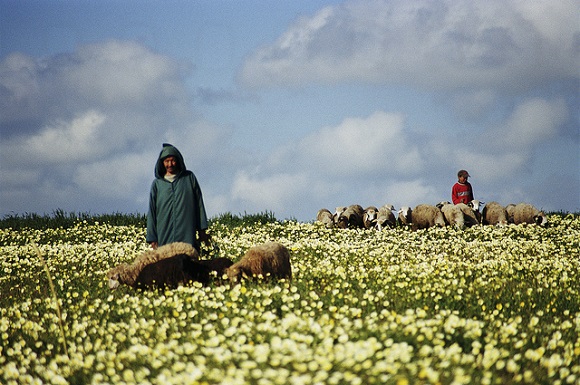Findings from the rural youth in dryland agriculture study

The sustainability of agriculture and food production relies on young people remaining in rural areas and engaging in agriculture, in particular in challenging areas like drylands and mountain areas, and in countries of high youth migration like Morocco.
However, the lack of engagement of youth in agriculture, compounded with a declining interest among young professionals in pursuing agriculture-related careers has resulted in an ageing agricultural system. There is thus the risk that fewer dynamic youth are exploring on- and off-farm innovations, and that there will be fewer experienced people to take over agricultural activities and thus reduced transfer of knowledge from the older to the younger generation. Despite recognizing the importance of engaging youth within the agricultural development community to seek sustainability in agriculture, a cohesive approach has not yet been defined and efforts remain fragmented and piecemeal.
This is why the CGIAR Research Program (CRP) on Dryland Systems decided to confront the challenges of youth targeting and engagement within the CRPs. In light of this and under the framework of the CGIAR Research Program (CRP) on Dryland Systems, YPARD, Bern University of Applied Sciences, School of Agricultural, Forest and Food Sciences HAFL and the Royal Tropical Institute (KIT) set out to carry a study on the realities, perceptions, challenges and aspirations of rural youth in dryland agriculture in the Midelt province, Morocco.
The Study
Based on the need to study different contexts, the overall goal of this research was to understand the livelihoods and the factors that influence the choices and decisions of rural youth in the study area, to be able to provide detailed scientific evidence for required support programs and interventions. The study also aimed to develop and test a methodology that can be used to replicate similar studies in other contexts. Morocco, specifically in terms of rural agriculture, youth, or the health of the local agricultural sector.
Using a combination of qualitative and quantitative participatory research methods, the study analysed rural youth’s realities, perspectives and aspirations in dryland Agricultural Livelihood Systems (ALSs) in the Midelt Province, Morocco, with a particular focus on gender. In particular,the study addressed four research questions as thus;
- What are their realities and their perceptions of agriculture?
- What are the challenges they face (i.e., low productivity, lack of access to inputs and technology, low participation in decision-making, environmental threats)?
- What are their perceived opportunities to remain engaged in agriculture?
- What are their aspirations in life (i.e., remaining in agriculture or migrating to find a job in an urban centre)?
Findings and Recommendations
In rural dryland areas where basic needs are met, youth involved in agriculture would indeed prefer to stay in their villages and develop their agricultural vocation. These findings are in contrast to the general perception that the majority of rural youth aspire to migrate to urban areas in search of better livelihoods.
On the one hand, the study results indicate that there is considerable interest—particularly among male youth—in continuing to develop their rural agriculture. On the other hand, increased structural investments into improving the livelihoods of these rural populations are necessary to reduce outmigration. In both cases, for existing and future generations to stay in rural areas, increased access to basic education and vocational training geared toward sustainable agriculture in drylands must become a priority.
Some of the study’s recommendations include that to support the youth’s aspirations and their willingness to stay in agriculture, there is a need for infrastructural and regulatory interventions and specific training in agricultural practices targeting and engaging youth.
This (freely available) study is but one example of the highly context-specific situation that millions of rural youth find themselves in. We hope that this inspires more research to be conducted in this area, so that we can all better understand how to support youth in the areas that we work.
Download your copy of the report from the YPARD e-library.
Photo credit: World Bank Flickr
Related Posts
Comments
By accepting you will be accessing a service provided by a third-party external to https://archive.ypard.net/

